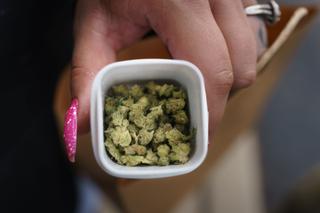Spotlight PA is an independent, nonpartisan newsroom powered by The Philadelphia Inquirer in partnership with PennLive/The Patriot-News, TribLIVE/Pittsburgh Tribune-Review, and WITF Public Media. Sign up for our free newsletters.
HARRISBURG — As the legislative session picks up, Pennsylvania lawmakers are considering a host of changes to the state’s cannabis laws that would expand who is eligible for a medical marijuana card and increase protections against DUI charges for patients, among other proposals.
And the new Democratic majority in the state House is bringing fresh hope to advocates who want to see Pennsylvania join dozens of other states where possessing a small amount of cannabis is legal or decriminalized.
Amending marijuana laws could open up debate over a host of other issues — several of which were highlighted in a series of investigative stories from Spotlight PA that uncovered serious flaws in the medical program, including questionable health claims, weak oversight, and unfair rules. Here are the five marijuana proposals to watch this legislative session.
Overhauling the medical program
Two state senators — a Republican and Democrat — are pushing for major changes that would broaden who is eligible for a medical marijuana card.
Currently, the law limits which patients and doctors can participate. Doctors must register with the state and complete a four-hour training course in order to approve patients. And patients can only qualify for a card if they have one of 23 approved conditions.
The proposal from state Sens. Mike Regan (R., York) and James Brewster (D., Allegheny) states “elected officials and bureaucratic staffers should not be deciding what ailment qualifies an individual to use medical marijuana.” Their proposal would allow any doctor who is authorized to prescribe controlled substances to decide whether a patient can use cannabis.
Their proposal would also eliminate the need to renew medical marijuana cards — which are issued by the state. The annual cost is $50, although the department says it has eliminated the fee for people in certain financial hardship programs, such as Medicaid.
Regan and Brewster have not introduced their legislation yet, and Brewster said there are a number of issues that are still up for discussion. For example, the senators did not clarify in their memo whether patients would still need to renew their certification at least once a year. Some patient advocates have urged the state to allow lifetime certifications for patients with terminal or chronic medical conditions.
Separately, state Sen. Dan Laughlin (R., Erie) wants to allow patients to buy cannabis in edible forms. Last session, he and state Sen. Sharif Street (D., Philadelphia) also proposed allowing patients to grow a limited number of cannabis plants at home — a change that several cannabis advocates told Spotlight PA would reduce the cost burden on patients.
Judith Cassel, a Harrisburg attorney specializing in cannabis issues, wants to see lawmakers eliminate an unequal advertising system.
State law bans doctors from advertising that they can approve patients for the program — which gives an advantage to third-party businesses that offer to connect patients to doctors. Those businesses operate with little to no oversight.
“Brokers who have no medical experience whatsoever are out advertising and getting patients to sign up with them,” Cassel told Spotlight PA.
She said the uneven playing field deprives doctors of income, while the fees that go to these companies drive up costs for patients.

Decriminalization
Across the country, 21 states have legalized adult-use cannabis and 10 more have “decriminalized” simple possession in some way, according to the Marijuana Policy Project.
“Most of the decriminalization states impose a civil fine, which avoids the life-altering collateral consequences a criminal record carries,” according to the group.
But Pennsylvania residents can still face criminal charges for possessing small amounts of marijuana. Under state law, someone who possesses 30 grams of marijuana or less can be convicted of a misdemeanor and face up to 30 days in jail and up to a $500 fine.
“I’d like to see the arrests stop first,” said Chris Goldstein, a regional organizer for the National Organization for the Reform of Marijuana Laws. “They’ve stopped all over the country. But Pennsylvania is proceeding forward with criminal prohibition almost unabated.”
Philadelphia, Pittsburgh, and some other municipalities have reduced possession penalties on their own. But decriminalization bills have not progressed in the state legislature in recent years, Goldstein said.
One bipartisan bill in the Senate last session would have reduced the penalty for possessing a small amount of marijuana to a summary offense, cut the maximum fine for possession to $25, and eliminated jail time for that charge. Smoking a small amount of marijuana in a public space would have a maximum fine of $100. The bill did not receive votes in committee. Decriminalization legislation is expected to be introduced again this session.
DUI protections
Pennsylvania is one of 12 states that has a zero-tolerance law that prohibits driving with any amount of marijuana in the body, according to the National Conference of State Legislatures. Drivers in Pennsylvania can face criminal charges if they have “any amount” of marijuana or its metabolites in their blood — even if they are registered medical marijuana patients.
“Because of this, unimpaired patients currently face the risk of being arrested, prosecuted and convicted for using medicinal marijuana that has no bearing on their ability to drive a vehicle,” state Sen. Camera Bartolotta (R., Washington) wrote in a memo to her colleagues.
Bartolotta’s proposal would require proof of actual impairment as the basis for a DUI conviction in those cases. Last session, the measure passed out of committee without opposition but did not receive a vote in the full Senate.
“There just wasn’t time to get it on the floor,” Bartolotta told Spotlight PA. “But I’m optimistic that we will be able to move forward.”
Employment rules
An investigation last year from Spotlight PA showed how gray areas in the state’s medical marijuana law create unnecessary confusion and force workers to choose between their job and a doctor-approved drug. Neighboring states such as Delaware, New Jersey, and New York offer greater protections to workers.
A proposal last session would have placed specific restrictions on people working in several newly defined safety-sensitive positions, including firefighters, pharmacists, and people who directly care for patients or children. The measure passed out of a Senate committee with all Republicans in favor and all Democrats against. The bill then died in the full chamber.
A new version of the bill has not been introduced yet, but the issue is still a priority for the Pennsylvania Chamber of Business and Industry.
“The concerns still remain,” Alex Halper, the chamber’s vice president for government affairs, told Spotlight PA. “The current medical marijuana law is ambiguous. It’s unclear and puts employers, and employees, and job applicants in a difficult position.”
Legalization
New York and New Jersey allow adults 21 and over to use marijuana. In the fall, Maryland voters approved adult-use legalization with a ballot question and now lawmakers are rolling out planned changes.
Democratic Gov. Josh Shapiro campaigned on legalizing cannabis for adults. Two Republican state senators have come out in support of legalization. But Senate President Pro Tempore Kim Ward (R., Westmoreland) in November said the federal government would need to remove its prohibition before she would want to talk about legalizing recreational cannabis here.
There has been little action in the legislature since the new session began as Republicans and Democrats have wrestled for control of the state House. Democrats won a narrow majority in the state House with three special election victories on Tuesday.
More Democrats than Republicans support legalizing cannabis. But it is not clear if there are enough votes to pass adult-use legalization. Nicole Reigelman, a spokesperson for state House Democrats, told Spotlight PA the caucus supports improving the “medical marijuana law to ensure employment protections for medical marijuana cardholders and to address DUI penalties, so long as a person is not impaired.”
“Any expansion of the marijuana industry for adult use would need to emphasize health and safety, social justice, and equity, as well as supporting the industry’s workforce,” Reigelman said in an email.
Patrick Nightingale, an attorney and executive director of the Pittsburgh chapter of the National Organization for the Reform of Marijuana Laws, hopes the change in power will result in cannabis bills at least receiving committee hearings in Harrisburg.
“When the Republicans were in the majority … they appointed the committee chairs, and if their leadership didn’t want something moving through committee, it didn’t,” Nightingale told Spotlight PA. “That barrier no longer remains.”
WHILE YOU’RE HERE… If you learned something from this story, pay it forward and become a member of Spotlight PA so someone else can in the future at spotlightpa.org/donate. Spotlight PA is funded by foundations and readers like you who are committed to accountability journalism that gets results.
